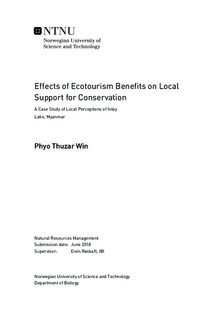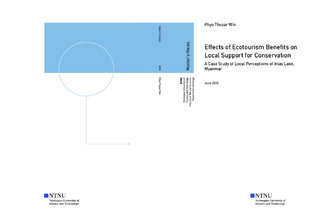| dc.description.abstract | Conservation efforts by the local people are increasingly seemed as important with respect to the protected area management of developing countries. Such practices often involve ecotourism through income generating activities. It is worthy for the inclusion of ecotourism in protected area management if it generates funding for PA conservation, enhances benefit-sharing for the community, reduces resource-intense practices and encourages their positive perceptions towards conservation. In this study, the effects of ecotourism benefits on PA have been tested in terms of perceiving ecotourism as beneficial, conservation involvement and perceptions towards ecotourism and conservation by the local people. Local people are meaningful stakeholders as they depend on Inlay Lake in Myanmar for their primary livelihood. Subsequent to this, demographic factors that influence the local receipt of ecotourism benefits, conservation involvement and perceptions were also identified. Among them, locality and occupation were found to be significant factors that influence local perceptions towards ecotourism and conservation. Using a questionnaire survey, 250 farmers, fishers, ecotourism-related people and other residents living in the vicinity of the lake, lowlands, and highlands were sampled. Other significant variables included age, gender, education, household size, land-holding size and local knowledge. The results revealed that 45% of the respondents perceived ecotourism as beneficial, while 55% had never or seldom participated in conservation activities related to wetland and biodiversity. Furthermore, local people are optimistic about ecotourism but their conservation perceptions are only marginally positive. In addition, lake dwellers are more likely to perceive ecotourism as beneficial and are also more inclined to support conservation. The results also indicated that farmers participate in conservation activities more frequently than do fishers and ecotourism-related people. Livelihood change neither affected involvement in ecotourism nor reduced the existing traditional use of wetland. Accordingly, the effects of ecotourism benefits on conservation are discussed in the context of protected areas ensuring benefits from ecotourism as a result of local support. | |

